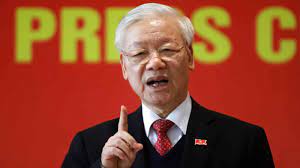HANOI – Vietnam’s Communist Party General Secretary Nguyen Phu Trong, the country’s most powerful figure, has passed away at the age of 79, according to state media reports. Trong’s death on Friday ends more than 13 years of leadership, following a reported illness.
The announcement came a day after the party revealed that Trong would step down to focus on medical treatment for an undisclosed condition. State media reported that he died at a military hospital due to old age and serious illness. A national-level funeral will be organized, with further details to be announced.
Trong’s death occurs during a significant political transition in Vietnam. A new president, To Lam, was appointed in May following the resignation of Vo Van Thuong in March over “violations and shortcomings.” Lam, a former public security minister, is now serving as the largely ceremonial president and is seen as a strong contender for the top job.
The Politburo has called for unity and trust in the party’s leadership amid a comprehensive overhaul of the communist administration. This period has seen the fall of several ministers, business leaders, and two presidents as part of a sweeping anticorruption campaign.
Vietnam’s leadership structure places the general secretary at the helm of power. Trong’s declining health had sparked speculation about his ability to remain in office until the 2026 party congress. His tenure, beginning in 2011, was marked by increasing authoritarianism and a vigorous anticorruption drive, dubbed the “blazing furnace,” which led to the disciplining of thousands of officials, including eight Politburo members.
Born in 1944 in Hanoi, Trong was a Marxist-Leninist ideologue with a degree in philosophy. He joined the Communist Party at 22 and studied in the Soviet Union from 1981 to 1983. Known for his technocratic approach and close ties with China, Trong’s leadership saw Vietnam navigate complex geopolitical landscapes with a policy of “bamboo diplomacy.”
Trong’s era witnessed Vietnam maintaining its relationship with China despite South China Sea disputes while strengthening ties with the United States, culminating in a comprehensive strategic partnership. On Friday, China’s Communist Party extended condolences over Trong’s passing.
Nguyen Khac Giang, a visiting fellow at Singapore’s ISEAS–Yusof Ishak Institute, noted that Trong’s anticorruption efforts, while impactful, led to an erosion of party institutions, concentrating power in individuals rather than maintaining a balance among factions.
Speculation about Trong’s health had persisted since he was hospitalized in 2019 and appeared frail during recent meetings with international leaders. His death leaves a political vacuum in Vietnam, with To Lam expected to become the next party chief. However, Giang predicts an uncertain future for Vietnamese politics, citing shaky norms and institutions.
HANOI – Vietnam’s Communist Party General Secretary Nguyen Phu Trong, the country’s most powerful figure, has passed away at the age of 79, according to state media reports. Trong’s death on Friday ends more than 13 years of leadership, following a reported illness.
The announcement came a day after the party revealed that Trong would step down to focus on medical treatment for an undisclosed condition. State media reported that he died at a military hospital due to old age and serious illness. A national-level funeral will be organized, with further details to be announced.
Trong’s death occurs during a significant political transition in Vietnam. A new president, To Lam, was appointed in May following the resignation of Vo Van Thuong in March over “violations and shortcomings.” Lam, a former public security minister, is now serving as the largely ceremonial president and is seen as a strong contender for the top job.
The Politburo has called for unity and trust in the party’s leadership amid a comprehensive overhaul of the communist administration. This period has seen the fall of several ministers, business leaders, and two presidents as part of a sweeping anticorruption campaign.
Vietnam’s leadership structure places the general secretary at the helm of power. Trong’s declining health had sparked speculation about his ability to remain in office until the 2026 party congress. His tenure, beginning in 2011, was marked by increasing authoritarianism and a vigorous anticorruption drive, dubbed the “blazing furnace,” which led to the disciplining of thousands of officials, including eight Politburo members.
Born in 1944 in Hanoi, Trong was a Marxist-Leninist ideologue with a degree in philosophy. He joined the Communist Party at 22 and studied in the Soviet Union from 1981 to 1983. Known for his technocratic approach and close ties with China, Trong’s leadership saw Vietnam navigate complex geopolitical landscapes with a policy of “bamboo diplomacy.”
Trong’s era witnessed Vietnam maintaining its relationship with China despite South China Sea disputes while strengthening ties with the United States, culminating in a comprehensive strategic partnership. On Friday, China’s Communist Party extended condolences over Trong’s passing.
Nguyen Khac Giang, a visiting fellow at Singapore’s ISEAS–Yusof Ishak Institute, noted that Trong’s anticorruption efforts, while impactful, led to an erosion of party institutions, concentrating power in individuals rather than maintaining a balance among factions.
Speculation about Trong’s health had persisted since he was hospitalized in 2019 and appeared frail during recent meetings with international leaders. His death leaves a political vacuum in Vietnam, with To Lam expected to become the next party chief. However, Giang predicts an uncertain future for Vietnamese politics, citing shaky norms and institutions.

